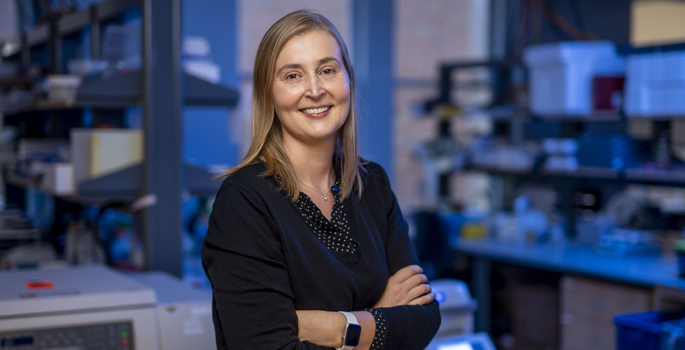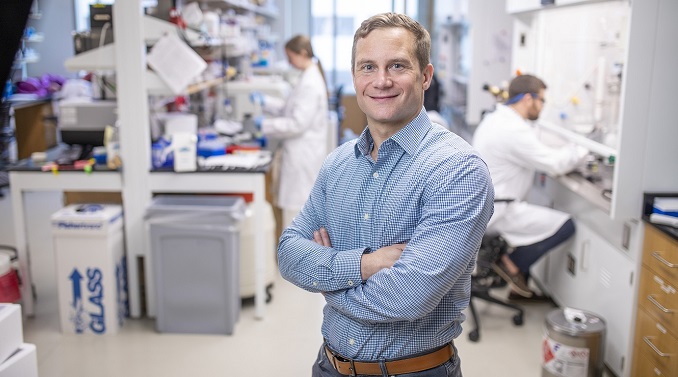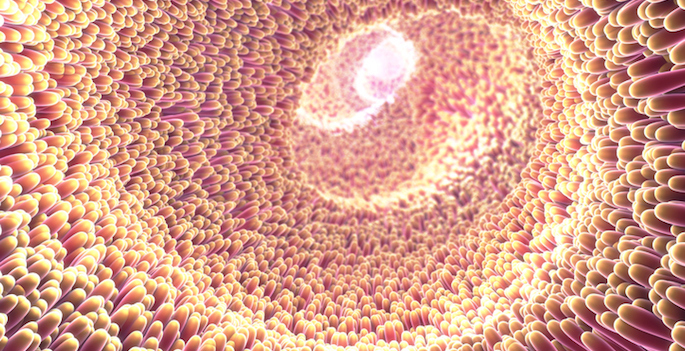Research
-

Team discovers one more piece to the autism puzzle
Vanderbilt investigators have linked genetic mutations in a single receptor to epilepsy, autism and intellectual disability. Read MoreOct 3, 2019
-

A catalog of DNA replication proteins
Vanderbilt scientists have identified 593 proteins that are enriched at sites of DNA duplication and chromatin packaging of newly synthesized DNA. Read MoreOct 3, 2019
-

Research team sorts out drug screen false positive results
Vanderbilt investigators have identified 13 previously unknown drug compounds that cause false positive screenings for amphetamines, buprenorphine (an opioid), cannabinoids and methadone. Read MoreOct 2, 2019
-

Pua lands NIH Director’s New Innovator Award
Heather Pua, MD, PhD, one of 60 investigators to receive the 2019 NIH Director’s New Innovator Award, will explore a novel type of cell signaling by RNAs in allergic airway inflammation. Read MoreOct 1, 2019
-

Study shines light on architecture of kidney disease
A study of 280,000 U.S. veterans, including 56,000 African Americans, has identified in greater detail than ever before the genetic architecture of kidney function and chronic kidney disease (CKD), according to researchers at Vanderbilt University Medical Center and their colleagues. Read MoreSep 25, 2019
-

Wilson awarded Komen breast cancer research grant
An engineering professor has received financial support from Susan G. Komen for breast cancer research. His project is among 60 grants totaling $26 million awarded to researchers nationwide. Those initiatives are focused on improving outcomes for metastatic breast cancer, reducing disparities in survivorship and developing new, more effective treatments. John T. Wilson, assistant professor of... Read MoreSep 25, 2019
-

Diabetes drug study explores cardiovascular risks for patients with kidney disease
An observational study using medical record information from nearly 50,000 U.S. military veterans sheds new light on which drugs are best for patients with Type 2 diabetes and one of its common complications, kidney disease. Read MoreSep 25, 2019
-

Treating C. diff: new purpose for an old drug?
An inexpensive generic drug once used to prevent gastrointestinal ulcers in people taking daily NSAIDs protects against C. diff infection in mice. Read MoreSep 24, 2019
-

Tailoring treatment for heart defect
By defining the clinical and genetic factors that predict treatment response, Vanderbilt investigators aim to personalize therapy for a common heart complication in preterm infants. Read MoreSep 23, 2019
-

Guengerich, Sanders-Bush named ASPET fellows
Vanderbilt University’s F. Peter (Fred) Guengerich, PhD, and Elaine Sanders-Bush, PhD, are among 22 prominent scientists named this week to the inaugural class of fellows of the American Society for Pharmacology and Experimental Therapeutics (ASPET). Read MoreSep 20, 2019
-

Microvilli in motion
Live cell imaging studies have revealed that microvilli — finger-like protrusions on the surface of epithelial cells — move and collide as they form the brush border. Read MoreSep 19, 2019
-

Gamazon receives NIH Genomic Innovator Award
VUMC's Eric Gamazon has received a Genomic Innovator Award from the National Human Genome Research Institute, part of the NIH. Read MoreSep 19, 2019
-

Potential prostate cancer biomarkers
An analysis of more than 140,000 people of European ancestry has identified blood protein biomarkers associated with prostate cancer risk. Read MoreSep 19, 2019
-

All-in-one pill helps reduce blood pressure, cholesterol
A single pill containing low doses of three medications to treat high blood pressure and one to lower cholesterol reduced the estimated risk of cardiovascular disease by 25%, according to a VUMC study. Read MoreSep 19, 2019
-

Department of Energy webinar on federal funding set for Sept. 26
A special webinar on federal funding from the Department of Energy is scheduled for Thursday, Sept. 26, from 2 to 3 p.m. in the Baker Building, Room 800C. Remote viewing will be available with advanced registration. Register here to attend the webinar in person or remotely. “DOE and Biological Sciences” will cover a broad range of... Read MoreSep 17, 2019
-

Relational memory in early psychosis
Studies of relational memory function may reveal novel mechanisms for therapeutic intervention for patients in the early stages of psychosis. Read MoreSep 10, 2019
-

Astrocytes and epilepsy
A protein with important functions in astrocytes — star-shaped brain support cells — may alter neuronal excitability and contribute to seizure activity, Vanderbilt researchers report. Read MoreSep 9, 2019
-

How salt increases blood pressure
Vanderbilt researchers have discovered that a protein called SGK1 in immune cells is activated by sodium, leading to the development of salt-sensitive hypertension. Read MoreSep 5, 2019
-

The plus and minus of microtubules
Understanding the dynamic regulation of cytoskeletal microtubules may suggest new ways to treat disorders ranging from Alzheimer's disease to cancer. Read MoreSep 5, 2019
-

Zebrafish aid effort to regenerate damaged retinas
According to a new study, the tiny zebrafish may hold the secret to regenerating damaged retinas in humans. Read MoreSep 5, 2019